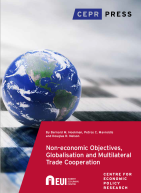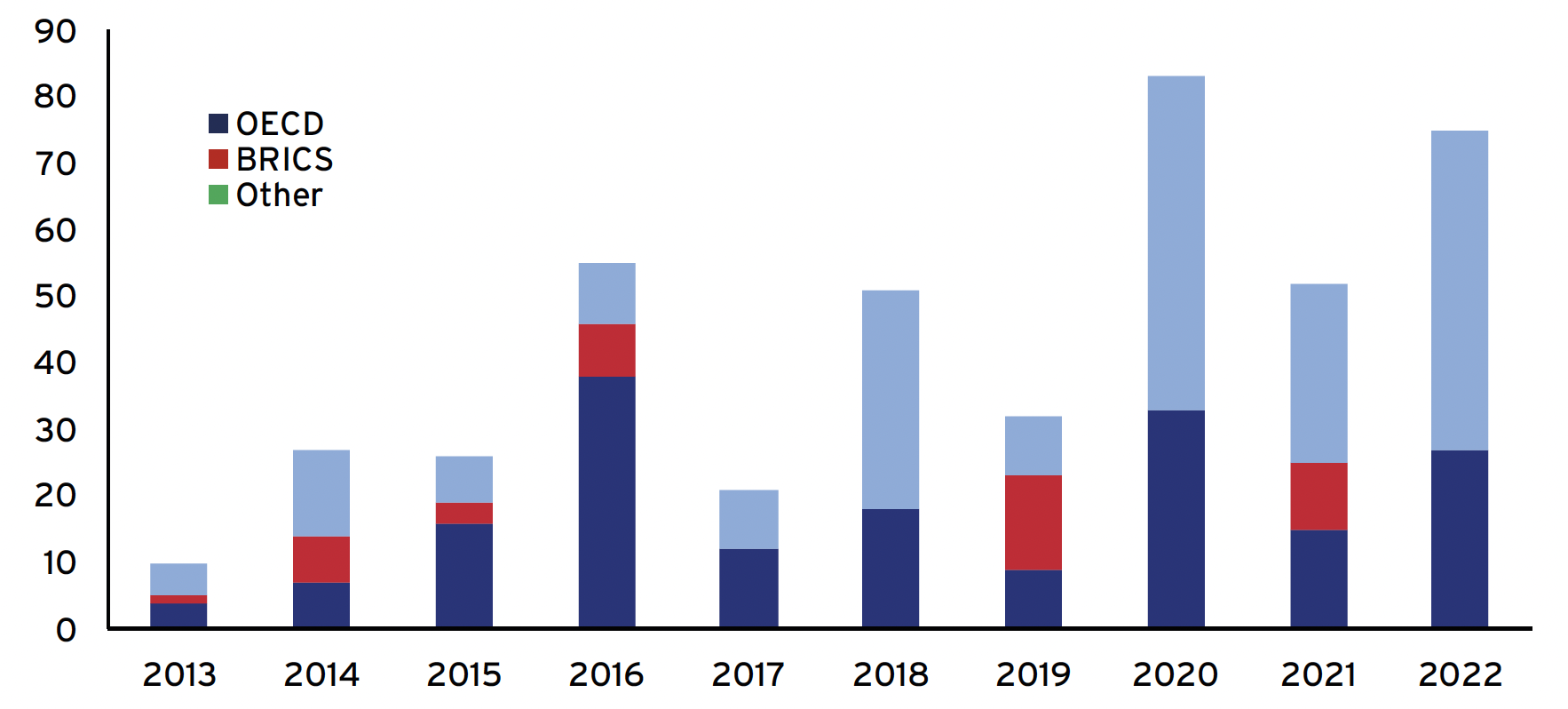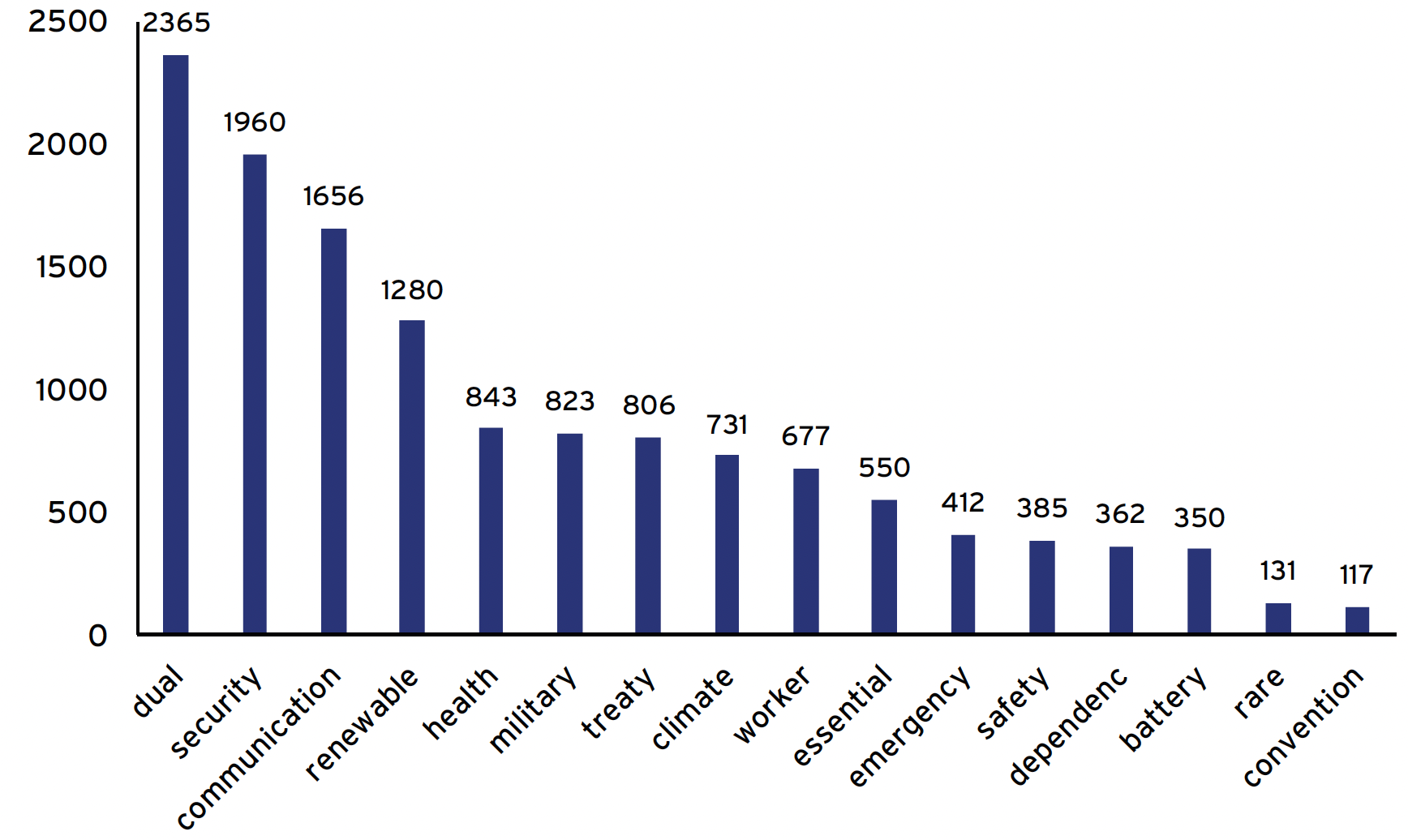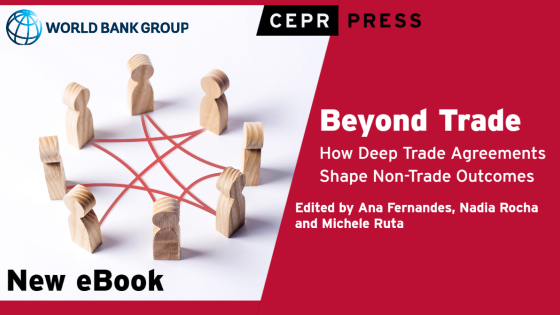Trade and investment policy is increasingly becoming politicised. One reason is that in the context of low formal border protection, global value chains (GVCs) create demand by participating firms for disciplines on domestic regulatory policies that affect operating costs, explaining why ‘behind-the-border’ policies have come to be included in deep trade agreements (Fernandes et al. 2023). In contrast to tariffs, because many of the policies constitute domestic regulation, they are more politically sensitive, affecting a much larger set of domestic interests. Another reason is that governments have become more concerned with non NEOs: environmental sustainability, public health, labour standards, human rights, and many others. Often the pursuit of NEOs involves policies that target GVC-based production and exchange, reflected in regulatory instruments seeking to make supply chains more resilient to shocks, to prohibit or disincentivise the use of specific inputs or production processes, to reduce national dependence on certain sources of supply (Arjona et al. 2023), or to require due diligence and third-party auditing of international supply chain operations. A third reason is the ‘backlash against globalisation’ reflected in rejection of the so-called ‘neoliberal’ national economic policies and multilateral institutions that supported international integration.
While evidence for significant decoupling is still limited (Freund et al. 2023) the sustained higher rates of economic growth in major developing economies that has been a source of adjustment pressures in OECD member countries combined with increasing geo-economic rivalry with China is driving a resurgence in state intervention in the original core members of the GATT. To date, the focus of greater recourse to unilateral intervention in trade and investment by large trade powers has mainly been to support domestic economic activity in priority sectors. Instruments to do so have mostly involved subsidies of different types, complemented by trade and investment measures motivated by safeguarding competitive neutrality and NEOs such as national security, environmental sustainability, and protection of human rights. The pursuit of unilateral measures to attain or protect NEOs increases political risk perceptions and policy uncertainty, inducing lead firms that operate GVCs to re-think their international investment and commercial partnership strategies.
The trends are clear in notifications to the WTO of quantitative trade restrictions. Whereas in the past these tended to fall mostly under the general exceptions provision of the WTO (e.g., to protect the environment), the number of such measures motivated by essential security considerations has been rising steadily (Figure 1).
Figure 1 Notifications of quantitative trade restrictions mentioning ‘essential interests’, 2013-2022
A search of the Global Trade Alert database, an independent trade policy monitoring initiative that provides much more extensive information on the use of trade-related policy instruments than the WTO reveals that among trade interventions motivated by NEOs, security-related keywords have become the most prevalent type of noneconomic objective mentioned in the underlying documentation describing the purpose of a trade measure (Figure 2).
Figure 2 Number of times a NEO-related keyword appears in GTA measures, 2009-2022
As a result of the complexities of NEOs and the way they interact with each other, the design and implementation of trade policy has become much more intricate. A corollary of the increasingly multifaceted trade policy environment is that international trade cooperation to reduce cross-border policy spillovers no longer works as well as it used to when the agenda centred on reciprocal reduction of border barriers on a non-discriminatory basis. Instead, strategic autonomy, economic security and other NEOs motivate calls for collaboration among countries with similar values and political-economic systems – i.e. clubs of like-minded states (‘friends’). Arguably the greatest threat to the liberal trade order is the increasing rejection of the basic values of that regime. The emergence of anti-liberal political movements of the left and right in many high-income countries is spilling over to a critique of the rules-based multilateral trading system. An essential part of both the left and right critiques of democratic capitalism is an explicit rejection of global liberal policies and institutions. If the exceptions provisions included in the WTO are used in bad faith, this is actively destructive of multilateral trade regime. For the rules to function there must be general acceptance of norms of good behaviour. When countries use public morals or values as a cover for simple protectionist policy, they are violating those norms.
Our new study considers implications of these developments for the global trade regime and multilateral trade cooperation. The current rules and institutions of the world trading system are not built to deal with the structural changes affecting the global economy. The erosion of trust among the large economic powers that has resulted from (perceived) increased willingness to ‘weaponise’ trade policy is a major constraint to launching negotiations on new rules of the game. Our premise is that for the WTO to remain relevant in the 21st century, the membership must recognise the way that international trade increasingly is linked to system competition, cooperation, and contestation over NEOs for which trade is seen as instrumental to policy success. Efforts to create new ‘guardrails’ to safeguard the rules-based trade order and international economic activity (globalisation) should centre on frameworks to guide initiatives by governments to attain NEOs such as making supply chains more resilient or safeguarding national policy autonomy.
We argue a central feature of multilateral cooperation should be to establish processes in which states can engage in deliberation and dialogue with a view to identifying shared NEOs and reducing negative spillovers of associated policies on GVCs and globalisation more broadly. Both empirical research and historical experience demonstrate that a world in which mutually agreed rules no longer apply to all trading nations, especially the large powers, is one that can only have detrimental consequences for all countries (e.g. Yotov et al. 2019, Aiyar and Ilyina 2023, Campos et al. 2023). The opportunity cost of non-cooperative policies is greatly increased because the world confronts major, existential, threats and collective action problems.
Systemic differences and geopolitical rivalry need not preclude cooperation to attenuate and/or manage policy spillovers. The Biden administration has made clear that it is not interested in negotiating traditional preferential trade agreements (PTAs) that centre on reciprocal reduction of tariffs and nontariff barriers on substantially all trade. Instead, the US is pursuing issue-specific cooperation and frameworks to coordinate policies – for example, agreeing on good regulatory practices towards the digital economy, export controls, foreign direct investment, and GVCs. Recent examples include the EU-US Trade and Technology Council and the Indo-Pacific Economic Framework for Prosperity. Such arrangements have implications for the trading system insofar as they act as frameworks for cooperation among states to jointly condition trade and investment on shared values through, for example, production requirements relating to labour, human rights, and/or environmental sustainability. If associated regulatory cooperation arrangements are open to any country interested in participating, with benefits extended conditional on implementing agreed regulatory standards or principles independent of national political systems and governance, they can support a process of gradual multilateralisation. If instead they are designed to be exclusive arrangements, they will foster greater fragmentation of the world trade system.
As we argue throughout, cooperation must be rooted in an understanding of the objectives of the participants and the way their interests are related to the domestic and international commitments of the states involved. WTO reforms are not needed for discussions among members on NEOs, but there must be political willingness to go beyond the ‘bread and butter’ of the WTO: negotiating disciplines on trade policy without consideration of the rationale for using specific trade instruments. WTO members that condition access to their market on satisfying specific production requirements motivated by a NEO have an interest in others doing so as well. In many cases, states may share a NEO, providing scope for dialogue and discussion about the policy instruments. Cooperation can take the form of agreement to act in a concerted manner, but it is arguably better to put in place a framework that encourages states to use WTO-sanctioned clubs. This is in all WTO members’ interest. Greater scrutiny, transparency and discussion of the rationale, and analysis of the effects of trade-NEO issue linkages that are pursued by groups of countries would both benefit the jurisdictions pursuing such policies as well as those that do not join them but may be affected.
There is much to be gained from cooperating on NEOs of broadly common interest. Alliances (clubs) have long been a form of cooperation among states and are likely to figure more in the future as vehicles to support deeper integration among like-minded states. We argue that WTO reform discussions should include a focus on developing a multilateral framework to guide the use of trade and industrial policy by groups of like-minded economies motivated by NEOs. This would benefit members of potential clubs to design and implement policies that are efficient. It would also benefit non-members by reducing potential negative spillovers and adverse effects on the trading system. Basic features of any such framework should centre on using the WTO as a forum to increase transparency and support policy dialogue and peer review of the use of trade policy instruments.
References
Aiyar, S and A Ilyina (2023), “Geo-economic fragmentation: What it means for multilateralism”, VoxEU.org, 29 March.
Arjona, R, W Connell Garcia and C Herghelegiu (2023), “The EU’s strategic dependencies unveiled”, VoxEU.org, 23 may.
Attinasi, M G, L Boeckelmann and B Meunier (2023), “Unfriendly friends: Trade and relocation effects of the US Inflation Reduction Act”, VoxEU.org, 3 July.
Campos, R, Estefania Flores, J, D Furceri and J Timini (2023), “Geopolitical fragmentation and trade”, VoxEU.org, 31 July.
Fernandes, A, N Rocha and M Ruta (2023), “How deep trade agreements shape non-trade outcomes: A new eBook”, VoxEU.org, 20 June.
Freund, C, A Mattoo, A Mulabdic and M Ruta (2023), “US-China decoupling: Rhetoric and reality”, VoxEU.org, 31 August.
Hoekman, B, P C Mavroidis and D R Nelson (2023), Non-economic objectives, globalisation and multilateral trade cooperation, CEPR Press.
Kitzmüller, L, H Schweiger and B Javorcik (2022), "The reshuffling of global supply chains is already happening", VoxEU.org
Yotov, Y, J-A Monteiro, R Piermartini and M Larch (2019), “Trade effects of WTO: They're real and they're spectacular”, VoxEU.org, 20 November.









